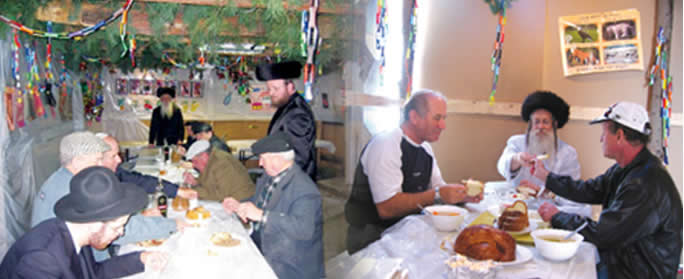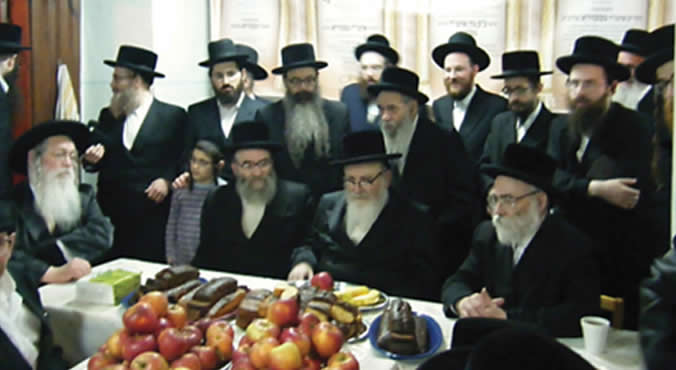AN ADVOCATE FOR THE JEWS OF BERDICHEV
(Courtesy: Hamodia- by Rabbi Yishai Sofer)
This 25 Tishrei marks two centuries since the passing of the Kedushas Levi, zy"a, the legendary advocate for the Jews. In honor of his yahrtzeit, we spoke to Rabbi Yaakov Yosef Wertzberger, shlita, of Tiferes Berditchev U'sevivoseha, who plays an instrumental role in the mission of revitalizing Judaism in Berditchev. Intent on banishing the darkness introduced by the Communists after World War II, Rabbi Wertzberger has worked tirelessly to rekindle the dormant sparks of faith in the hearts of the remaining Jewish residents of Berditchev. We thank him for sharing photographs taken last Chol Hamoed Sukkos.
 |
Sukkos kiruv in Berdichev |
Jewish Revival in Berditchev
The Jews of Berditchev are proud of their city's rich history as the home of the illustrious Kedushas Levi. They talk passionately about the Kedushas Levi, and the knowledgeable among them can even tell you a thing or two about his father, the great Rav Meir of Hosokov, and his righteous mother, Rebbetzin Sara Sosha.
Rabbi Wertzberger speaks exuberantly about the revitalization of Judaism taking place in Berditchev. "Over the years, a process of return has developed in which the children are drawing their fathers closer to their rightful heritage, stolen by the Communists.
"Ever since Communism's iron rule, many hid their Jewish identities in fear of the authorities. In order to give every single Jew in Berditchev a taste of the Jewish holidays, we placed ads in the local media inviting Jews to come celebrate Yom Tov with their Jewish brethren. And when they come, the spark returns to their eyes as they experience the spiritual high of being a Jew.
"Before each Yom Tov, we bring groups of chassidim and activists from Eretz Yisrael and America to infuse the joy of Yom Tov in the Jews of Berditchev. Ironically, the guests who have come to elevate their Jewish brothers all said it was a most uplifting experience for them, and they were infinitely grateful that they'd been granted this unique opportunity."
The Days of Awe
Rabbi Wertzberger gave us a moving description of the Days of Awe in Berditchev.
"Just a short while ago, Jews all over the world went to a body of water to recite Tashlich. In Berditchev, tears of emotion and joy flowed into the waters of the river as the men recited Tashlich from their Russian-language machzorim. On Erev Rosh Hashanah, the group of men from Eretz Yisrael led the Berditchever Jews in a recital of Hataras Nedarim, not in Aramaic but in Yiddish, a language that survived the Communist regime and is still known to many Jews in Ukraine.
"We told them about the Jew who didn't know how to pray and recited the letters of the aleph-beis, beseeching Hashem Himself to join the letters into a coherent tefillah. Many of these Jews, after decades of being deprived of their birthright, also don't know how to pray in lashon hakodesh. And so together, we recited the aleph-beis aloud with fervor and passion.
"These are Jews whose bond to Yiddishkeit was severed many years ago, but the dormant spark in their souls burst into a passionate flame when exposed to the beauty of their heritage.
"During the Yom Tov meals, old-time Yiddish songs were sung in addition to the niggunim of the Yom Tov. We shared inspirational insights, which one of the locals translated into Russian.
"How utterly soul-stirring it was when they sang the old Yiddish melody 'Ribbono shel Olam, Lamir Machen a Beit' [Let Us Make an Exchange], in which the Berditchever Rebbe carves out a 'deal' with the Creator. Some of the lyrics illuminate the Berditchever's boundless love of his fellow Jews: 'Master of the Universe, let us make an exchange ... I will give you sins, crimes, and transgressions, O Father; and if You ask me what You will give in exchange, I say You will give forgiveness, atonement, and absolution … And I, Levi Yitzchok, the son of Sara Sosha, say, Yisgadal v'yiskadash Shemei rabbah.'
"On Motzoei Shabbos and Motzoei Yom Kippur, they sang the Berditchever Rebbe's rendition of 'G-tt fun Avraham' at the Rebbe's tziyun.
"Moshe Tzachovitzky, a former partisan and the oldest member of the shul, attended every single one of the tefillos. He suffers from a heart condition and his vision is very limited, but he felt compelled to come to the tefillos.
"Most of the davening was sung aloud by the chazzan, word by word, since many of the mispallelim do not know lashon kodesh. But the men did join in at key passages such as 'Amen, yehei Shemei rabbah,' the Thirteen Measures of Mercy, and U'nesaneh Tokef. When the dozen and a half guests, together with the six dozen locals, joined in unison and answered, 'Amen, yehei Shemei rabbah,' it felt as if the entire shul was shaking from the powerful reverberations.
"As one of the guests later said, 'It was worth it to come from America just to be able to say Shema Yisrael with one [Berditchever] Jew.'"
Sukkos in Berditchev
It is said that the Kedushas Levi welcomed everyone into his sukkah, even those on the lowest rungs of spirituality, as long as there was a Jewish soul burning within them. With characteristic humility, he would say that in the future, when the Alm-ghty gathers the Jews into His sukkah made of the livyasan's hide, he too will ask to enter. And if the Heavenly judges deliberate about whether or not to allow him in, Reb Levi Yitzchok will be able to say that in this world he was not selective about whom to let into his sukkah, but rather allowed all Jews to enter. In this way, his petition will be accepted and he will be granted entry into Hashem's sukkah.
Today, following in the footsteps of the Kedushas Levi, every single Jew in Berditchev, no matter how far removed he may be from Judaism, is welcomed into the sukkah built by Tiferes Berditchev. Some of these Jews don't even go to shul on Shabbos and Yom Tov, but for some inexplicable reason, their neshamos draw them to the sacred "temporary dwelling."
Perhaps they inherited this longing from the tzaddik of Berditchev, who possessed a special passion for this mitzvah. Harav Dovid Abuchatzeira, shlita, mentions in one of his talks that before Sukkos, the Kedushas Levi would excitedly await the mitzvos of sukkah and the arbaah minim.
Dancing Hakafos on One Foot
Simchas Torah is a time when unbridled joy engulfs the Berditchev residents, softening hearts that have been hardened by decades of socialist dictatorship. These simple, unlearned Jews, whom Rabbi Wertzberger likes to refer to as "Reb Levi Yitzchok's Jews," revel in the ecstatic sensation of being part of the chosen nation.
One elderly man cried out emotionally, "I don't know how to learn Torah. But I do know how to dance, so I will dance solely for the honor of the Alm-ghty!" A blind old man entered the shul and asked to be led to a sefer Torah so that he could "kiss the holy scroll."
And in a corner of the shul, a man with one prosthetic leg stood throughout the hakafos, his eyes riveted to the sefer Torah; he wouldn't sit down for a minute. This fellow, whose name is Volva, lost his leg while fighting the Germans as a soldier during World War II. In his own way, this crippled man began to "dance." He tapped his foot to the beat of the singing, and his eyes shone with tears of joy. And just as he was unable to tear his eyes away from the sefer Torah, many in the room could not take their eyes off this radiant soul.
Leizer, another elderly man, arrived at shul only in time for the meal at noon. "Where were you?" his friends asked.
"May G-d forgive me," he replied. "I came late because I can't see well and I went to pick up the new glasses that I ordered so that I would be able to read from the Torah."
Picking up one's glasses at the optician's is, of course, forbidden on Yom Tov, yet this Jew's simple sincerity would undoubtedly elicit a passionate defense from the Berditchever Rebbe, the tzaddik who came to the defense of the lowliest of Jews.
The tzaddik once saw someone smoking on Shabbos. "Surely you forgot that it's Shabbos today," said the Rebbe, giving the man the benefit of the doubt.
"No, I remember good and well that it's Shabbos today," the man replied.
"So perhaps you forgot that it is forbidden to smoke on Shabbos?" the great advocate persisted.
But the young man answered, "I remember that it's forbidden to smoke on Shabbos."
Everyone present waited in suspense to hear if there was any line of defense the tzaddik could come up with in the face of such brazenness.
The tzaddik's astonishing response was "Look, Master of the universe. Even a Jew who has come to such a low level and deliberately smokes on Shabbos is not willing to tell a lie!"
 |
The Skverer Rebbe, shlita (seated, C ) in Berditchev. Sitting to his left is Harav Shlomo Yom Tov Breuer, Rav of Berdichev. Harav Yaakov Yosef Wertzberger is sitting at the head of the table. |